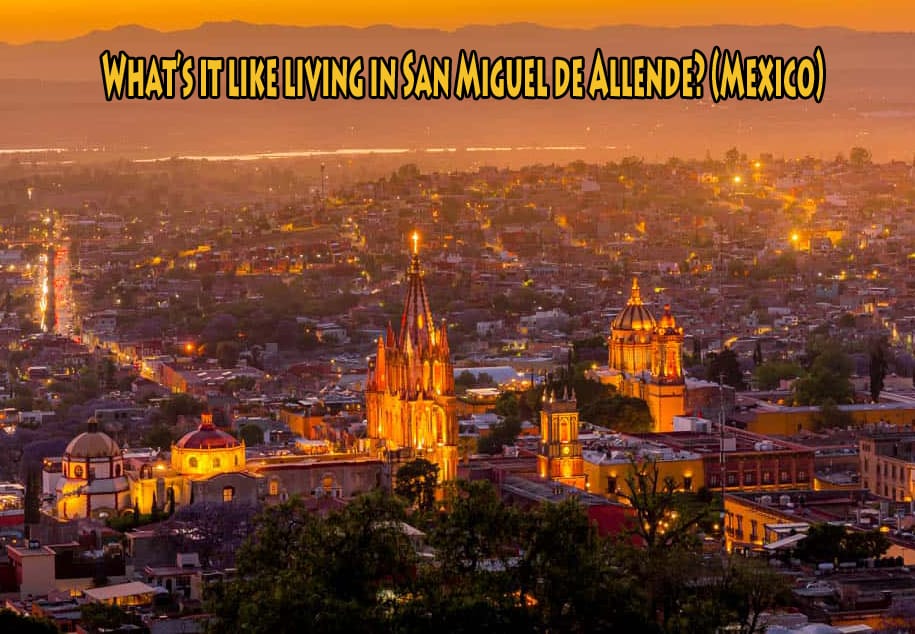
Why this serial expat chose France
Don’s a fellow Canadian and expat who’s probably seen more places than we have. We met him through the blog about 7 years ago and he always seems to be on the go: cycling through Serbia, hiking in Penang, lying on the beaches in Sri Lanka. He’s spent a lot of time searching for that “perfect” expat base, living in Panama, Slovakia and exploring much of SE Asia.
He recently decided that France would (or might?) be his future home and applied for the “visa de long séjour” (ie. “long stay Visa”). He is now based in France.
We were curious. Why France? And how does one go about getting residency in France? And what is the visa de long séjour?
We cover all the above in this interview.
Hi Don! Could you tell us about yourself?
It’s a long story! I grew up in Toronto but spent most of my career on the west coast, Vancouver, etc. I love spending time outdoors whether it was hiking, kayaking, skiing, etc., so I wanted to make a career where a good part of everyday was spent working outside. Well, that was the idea anyways. I’ve worked in almost all facets of forest management and in every kind of weather condition. Fun at first, but then day after day of cold rain and cloudy skies started to wear on me. After a while I learned that it’s one thing to spend time outdoors on your own terms and quite another to complete a job for the boss!
It was during my late 20s that I realized I could work as a forest consultant for the nice six months in Canada and then bugger off for the winter months. So for many years I alternated my winter months between Latin America and SE Asia and then returning home for work starting in April. I thought it was ideal, almost a perfect lifestyle! And then I lost my mind and decided to get serious with life – I started working full-time, having serious relationships, buying property and acquiring other stuff, etc…
Canada’s awful weather was a major motivating factor to look overseas for a better lifestyle, especially in the long-term (ie. looking towards early retirement). I first thought about living an expat lifestyle outside of Canada while traveling in Central America (Guatemala, Belize, Honduras). The weather was not only appealing but I also enjoyed being in the tropics and I found Latinos and their culture appealing. Spanish came fairly easily to me.
After an enjoyable and challenging stretch working as an advisor for the BC government, I decided the time was right to do a Masters, specializing in Latin American business management. The idea was to use my past work experience together with my newfound skills (and importantly, new connections) to springboard into an expat life somewhere in Latin America. For the most part it worked, not perfectly but the objective was achieved.
In 2001, my ex and I sold off everything and we moved down to Panama. I was working for a consultant on a couple of different and interesting projects. My partner at the time worked in the international school scene so it was no problem for her to get a job anywhere. We enjoyed Panama immensely but funding for my work dried up and my partner got a nicer teaching job in Costa Rica. So we moved to nearby San Jose and I ended up getting a contract with an international NGO in nearby Turrialba. Overall, it was a wonderful experience, work was challenging but also very interesting and we sure learned a lot about the pros/cons of an expat lifestyle. While attending events and parties in the uppity barrios of San Jose we frequently met many long-term expat retirees and one of the surprises for us was how disgruntled they all seemed to be with living there. We simply couldn’t understand why they were complaining about this and that and yet, they’re choosing to still live there! Meanwhile we were feeling pretty lucky to have embarked on this lifestyle. We knew that there were always going to be bumps along the way, but it was still a cool adventure … and we were having a blast! One of the nice advantages of being based in Costa Rica was that it allowed us to explore the region and indeed travel throughout Latin America and the Caribbean.
We stayed for 3 years before Europe began calling. So we headed to Bratislava and stayed there for 8 years. Well, my ex was teaching at an international school there and I ended up working in a variety of locations (Canada, Laos, Bolivia, etc.) which resulted in the dreaded long-distance relationship. By 2017 I was starting to look more seriously at my own retirement base somewhere in Europe, preferably in the Mediterranean region.

About the “perfect” expat base. What were your criteria? What other possibilities did you explore? How did you end up concluding that France would be the place that you want to settle?
Ah, that elusive perfect expat base! Well I think it’s a very personal thing and often it’s an experience of trial and error. As you get older, you zero in on what you believe should be the qualities of life that you desire. Again, a very personal experience. For me it came down to weather conditions, availability of a wide range of services, security situation, local environmental conditions and availability of recreational pursuits, etc.
After living in Latin America and Europe for extended periods – in addition to working for a time in SE Asia – I’ve found that there is no one size fits all. Living in southern France for the warmer months is lovely, but I learned from spending my first real winter here this past year that I might go crazy. Being able to jet down to the Canaries for a month of hiking saved me!
My preference now is to spend part of the year (May to Nov) in Europe where my partner lives and where I can pursue my passions. Then we can spend the winter months in the tropics. But with these ever-lengthening heatwaves in this part of the world, I think some adjustments to the strategy may be ahead!
It’s funny trying to find with that “perfect” expat base. I lived/worked in Vancouver for many years and it always ranks high in quality-of-life surveys. Meanwhile French cities never crack the top ten quality of life. Why is that?

Do you think France is the place you want to spend the rest of your life in? Is that your intention?
Probably, but I’m still not entirely sure. There are many aspects of living in France that are appealing to me. For one thing, my partner lives here and has property in a small, pretty town in the south. I think the quality of life here is quite high (despite the locals always complaining and the mystery of why French cities never rank high in those “best places to live” surveys). Personally, I enjoy the pace of life here, exploring the pretty stone villages of the south, getting groceries at the weekly marchés and cycle touring through the countryside is brilliant. There are also lots of festivals and events during the summer months. The quality of the food here is truly fantastic although I find dining in restaurants here underwhelming and overpriced. Winters here are always sunny, but chilly during the evenings and very, very quiet.
People are mostly friendly and helpful but language can still be a bit of a hurdle. On the plus side, my French has improved immensely since I’ve arrived. There are lots of older expats living in this area, mostly from other European countries. But most keep to themselves and, as someone who likes to stay active, I have found it difficult to make a connection with many of them.
The infrastructure here is superb, from the railway system to highways to urban transport to velo routes, all first class! But I’m also quite amused at seeing the French following the North American model of building around the automobile. You’ll see tangles of suburban roads, immense parking lots at big box stores, tedious strip malls, and nightmarish traffic jams!
Still, it’s difficult to say. Many expats that I have met moved to France some 30 years ago and are still gushing about living here and have little interest in even talking about living anywhere else. It’s “almost” paradise for them. But I’m not totally convinced. I think it really comes down to a person’s context. By that I mean their background, their values and their “world view”. I suppose some expats can receive sufficient stimulation by staying in one place almost continuously. Or perhaps, they’re no longer curious about other places if it involves the hassle of traveling and getting out of their comfort zone.
So yes, for many reasons I think France would be an ideal place to settle for the rest of my life. But at the same time I’ve come to accept that I’m a nomadic person by nature and I expect that I will continue to travel and explore for my remaining days. There are just so many unique places in the world that are not “captured” in France. Nowhere in France can I find wilderness like in the mountains of British Columbia. Nowhere in France will you experience sensory overload like being in India. And there are simply no places in France that have the jaw dropping landscapes of Namibia or Bolivia!
As the author Paul Theroux once commented…he continues to travel because it’s a way to satisfy his curiosities, to discover his limits, and to ease the passage of time. I like that bit of philosophy. Personally, I think it will come down to striking a balance between living part of the year here and part of it somewhere in the tropics – especially during the winter months.

So what’s the long sejour Visa Don? And what are the conditions to obtain it? Can you tell us about your experience?
The long séjour visa is the French version of the “D type” visa for stays extending beyond the 90 days allotted for stays under Schengen rules. I believe all European countries have their own version of a D visa.
This visa usually allows stays of up to one year with an option to renew it. There are different categories of this visa depending on its purpose. In addition to learning about the requirements for a French long séjour visa I also researched the Italian and Spanish versions. In my opinion the French requirements for a long stay visa were far less onerous and less expensive than either the Italian or Spanish version. But of course that’s not the reason I applied for it.
To obtain the initial long séjour visa, you have to be in your home country to apply. I first tried to apply in the summer of 2020, during the pandemic and of course the French consulate was not accepting applications for the category I was applying for. So I applied again in Aug 2021. The French long sejour visa doesn’t have a specific category for retirement purposes. So the default category is “visiteur”, which seems to work for most expats.
The application package consists of: 1) an online application form, 2) your passport, 3) a couple passport photos, 4) an attestation d’hébergement (confirmation of where you’re going to live), 5) proof of health insurance coverage for one year, 6) proof of sufficient financial resources, 7) a notarized statement that you will not work while in France and, 8) a statement describing your motivation for applying for the visa. I think that was it. You had to make an online appointment for an interview, which mostly involved reviewing your application package. The fee was: C$190 and it took almost 6 weeks to receive my passport back together with the long séjour visa sticker. After returning to France, you have two months to validate the visa and pay the mandatory €200 tax. You are also required to attend a medical exam.
Does the long sejour visa help you work towards eventual residency in France?
Yes, it’s a multi-step process. Technically, I currently have a resident permit that’s good for one year. A few weeks from now I will apply to convert this long séjour visa into a “carte de sejour” resident permit. After renewing this for 4 consecutive years, I become eligible to apply for a “carte de résident”, which is valid for 10 years.
Almost all the requirements to obtain the carte de sejour are the same as the visa de long sejour. But there is one additional requirement for my new dossier and that’s a birth certificate. I really don’t know why the French authorities need to see this but since I don’t have a version that qualifies, it now means that I have to wrestle with another bureaucracy to obtain an updated version…. a real pain in the ass!
In going through this process my only objective is to be able to stay in France, rather than having to do the Schengen Shuffle every 90 days. The fact that my partner lives here and there is a lot about France that I like has incentivized me to want to stay here long term. But I’m sure for the kind of lifestyle I wish to pursue, I could just as easily have embarked on the residency program in Italy, Spain or even Thailand and had most of my interests met.
I suppose I could continue to enjoy living here without going through the motions of obtaining long term residency. Obtaining French residency is certainly a big achievement if you’re young and coming from a struggling country with few opportunities. But I’m coming from Canada and so, what more can I expect from French residency, what additional rights or benefits could I receive? I don’t think there would be many. Indeed maybe it’ll cause me more headaches! Of course pursuing French citizenship is a different ball game and is of no real interest to me.

How has it been since arriving in France? Did you find a home base? What do you love (or not love) living in France?
I’ve been in France on and off now for about four years. I’m living with my partner in a beautiful restored house in a wonderful small town in the south near Nîmes. During the April to November period I really enjoy it, although this summer’s seemingly endless heat wave can be quite uncomfortable. And with climate change, the meteorologists are predicting increased frequencies of hot weather and drought conditions in these parts during the summer months. You just have to follow what the old timers did and stay inside (just like during the pandemic!) within cool stone walls during the afternoons…well yes, that and jump in the pool regularly and break the afternoon thirst with a long, cool G&T!
Note: Don and Collette rent their beautiful villa on Airbnb. If you’re interested, contact Colette for special offers at [email protected] and tell her you found it on this website (the Travels of Bbqboy and Spanky).
It’s interesting times to be reflecting on this – how changing climatic conditions are forcing me (and many others I’m sure) to reassess where we want to be during the summer months. In my earlier years (and it’s still the case), I wanted to avoid as much of winter as possible, preferring to spend those months in warm, sunny, tropical climes. Now I’ve been thinking about where to go when the summer heat revs up. I suppose the cooler northern or way southern latitudes, like Germany, Sweden, Canada, South Africa, Argentina, Australia. …..oh, la, la! Decisions, decisions!
Thank you very much for sharing all this information Don!
Want to be interviewed? If so send us an email or leave a comment

Related: What’s it like living in San Miguel de Allende? (Mexico)
Related: Expat Bases: Why this couple left Croatia to live in Turkey
Related: What Travellers and Expats should know about Managing their Finances




We moved from New York to France in 2006 after getting a Carte de Sejour Visiteur, which we easily renewed after a year. The requirements Frank described were exactly the same then. I think they looked for an annual income of at least $30K for the two of us. Although we signed a letter that we would not be working, my husband was headhunted soon and we found ourselves in the marvelous French healthcare system. Each year we renewed our Cartes de Sejour easily (although with different titles depending upon our work status). We never paid taxes in both the US and France due to a reciprocal agreement — I believe we paid US taxes the first year only and then French taxes the following years. We remained for 7 years. Met wonderful friends, including many American expats. Discovered Meetup there too so we had a really great social life. Miss it!
Thank you Vicki, sounds like you enjoyed your time! Can I ask where you ended up living?
Paris . . . it had to be Paris. We did get to see a lot of France though.
Very nice! Haven’t been in 30 years and looking to visit next year.
My hubby would be better at explaining this but for US citizens, there’s a real advantage to retiring in France because of the tax treaty between our countries. And that advantage is multiplied because after just 90 days of residency, you’re automatically in their health care system. You still have to go through the process of applying to receive a health card, but at the end of the year, you will pay for health insurance based on your taxable income. And if your taxable income is from pensions and retirement funds (which aren’t taxed by France) then your health care is — compared to US healthcare extortion rates — almost free. I think my hubby says for both of us it would be under $1,000 per year. [Right now, his insurance through his job is $1100 per MONTH.]
We had chosen France to be our ex-pat base, but as Don mentions, climate change is bringing record-breaking heat waves and fires. Like Don, we figured we’d travel during weather spells not to our liking, but now there’s the issue of Putin across the way. That’s not stopping many ex-pats from still moving to France, but it’s given us pause.
There are several Facebook groups for ex-pats wanting to retire in France. “Strictly Fiscal France” is a good one for money and tax questions.
Thank you for adding some interesting info Trishia!
This is all great information from someone who has done it. A few questions:
1) When they say you can’t work, I assume it’s because they understandably don’t want you taking a job from a local. What about digital nomad work that’s done online?
2) What are the tax implications? With a long-term visa are you subject to French income taxes? I never see that mentioned anywhere and information is hard to find.
Thank you.
Hi Michael,
I’m assuming that it’s the same as Spain:
1) Exactly. Digital Nomad – it depends. I don’t want to guess if France is clearer on that…
2) In Spain you’re liable for taxes if in the country 183 days or more. In France even stricter. I found this on that subject.
Hi Frank,
Thank you for that update. It’s been a while since we’ve chatted. You provide some of the best information on the internet about these expat topics. I wonder if there’s a Catch 22 that you have to be in a country for 183 days to fulfill the terms of the long-term visa, yet that also triggers paying taxes. These systems aren’t set up to deal with nomads so it gets complicated.
Take care.
Thanks Michael. Are you Michael Smith from Serbia? I have a few Michaels and I don’t recognize the email address.
A lot of expats come on “retirement” Visas and are not supposed to generate income while on a long-term visa. Like the Spanish non-lucrative Visa. But the thing is, after 5 years you qualify for Permanent Residency and then you can work if you like. Don’t really understand that…
Different countries have Nomad Visas now, including Croatia where we lived for a year+. Thing is they have a backwards immigration policy where it’s hard to get in as a 3rd country national (most countries want retired expats with money to spend) but they have a digital nomad visa for people who just want to hang out and live on the cheap…Doesn’t make sense.
Thanks for the kind words 🙂
Great article, Don sounds like an interesting guy. Great information about the Visa, sounds pretty easy. Thank you both for this writeup.